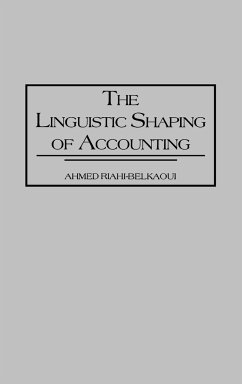Accounting may be viewed and analyzed as its own special sort of language says Riahi-Belkaoui, and accounting is the language of business. It represents phenomena in the business world as language represents phenomena in the larger world. To understand accounting as a language one must study such things as its readability and understandability, its impact on users behavior, its various linguistic repertories, and the impact that bilinguality has on accounting practices. Riahi-Belkaoui covers all this in a way that not only academics versed in linguistics will understand, but in a way that trained accountants will also find fascinating and useful, particularly in their international and multicultural activities. Riahi-Belkaoui examines what he considers to be the four major aspects of his topic. First, he explores how accounting messages are based on levels of readability and understanding. Second he shows how accounting includes both lexical and grammatical characteristics, and how these shape the perceptions and thoughts of users. He then illustrates the ways in which different linguistic repertories are used by different professional groups, and shows how this leads to communication problems and from there to a schism between academics and practitioners. Finally he argues that bilingualism in accounting has clear advantage. It provides greater mental and cognitive flexibility, increased metalinguistic ability, and also makes it possible to formulate concepts better and to deal with divergent thinking.
Hinweis: Dieser Artikel kann nur an eine deutsche Lieferadresse ausgeliefert werden.
Hinweis: Dieser Artikel kann nur an eine deutsche Lieferadresse ausgeliefert werden.

